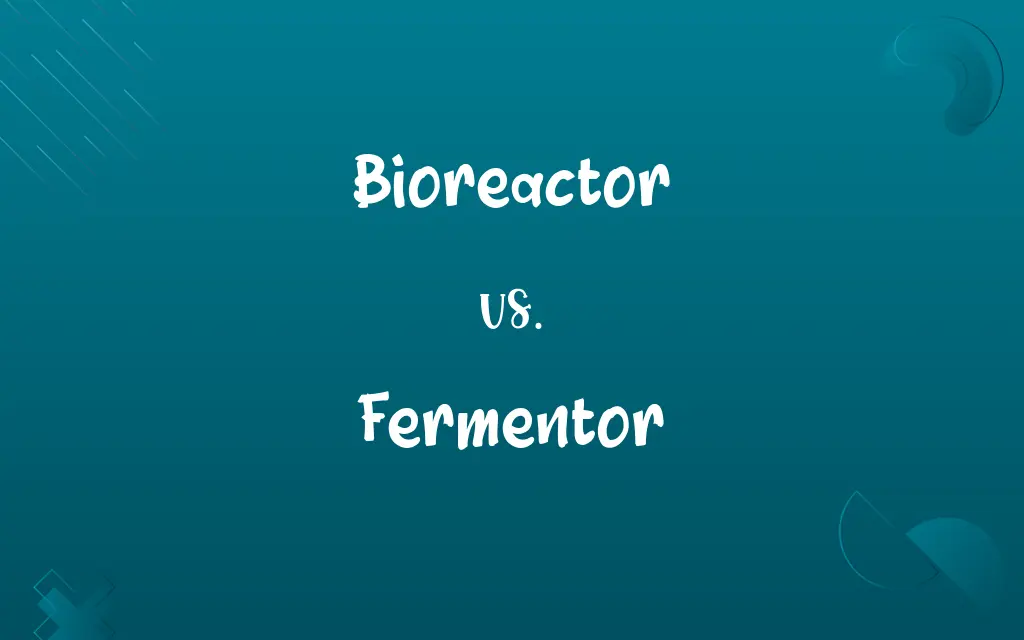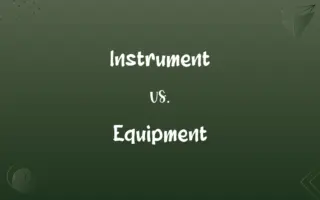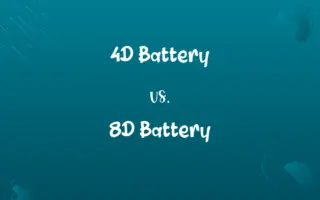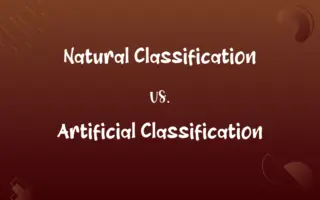Bioreactor vs. Fermentor: Know the Difference

By Shumaila Saeed || Updated on December 25, 2023
A bioreactor facilitates biochemical processes using living organisms, while a fermentor specifically supports fermentation, a subset of such processes.

Key Differences
A bioreactor is a vessel or system designed to support a biologically active environment, often used for growing cells or microorganisms under controlled conditions. Fermentors, a type of bioreactor, are specifically used for fermentation processes, which involve the breakdown of substances by bacteria, yeast, or other microorganisms.
Shumaila Saeed
Dec 10, 2023
Bioreactors are utilized in a variety of fields, including pharmaceuticals, wastewater treatment, and tissue engineering, showcasing their versatility. Fermentors are primarily used in food and beverage industries, such as in the production of beer, wine, and yogurt, where fermentation is the key process.
Shumaila Saeed
Dec 10, 2023
The design of bioreactors can be complex, accommodating different biochemical reactions and allowing for precise control over environmental conditions. Fermentors, while also controlled environments, are typically designed with fermentation-specific needs in mind, like anaerobic or aerobic conditions suitable for yeast and bacterial growth.
Shumaila Saeed
Dec 10, 2023
Bioreactors are integral to biotechnological applications that require the cultivation of cells or tissues, such as in the production of biopharmaceuticals or regenerative medicine. Fermentors, on the other hand, are more narrowly focused on culinary and beverage applications, where the conversion of sugars to alcohol or acids is crucial.
Shumaila Saeed
Dec 10, 2023
In essence, all fermentors are bioreactors, but not all bioreactors are fermentors. The term 'bioreactor' is broader, encompassing a wide range of biological processes, while 'fermentor' is specific to fermentation.
Shumaila Saeed
Dec 10, 2023
ADVERTISEMENT
Comparison Chart
Scope
Broad range of biochemical processes
Specific to fermentation processes
Shumaila Saeed
Dec 10, 2023
Primary Use
Biopharmaceuticals, tissue engineering
Food and beverage production
Shumaila Saeed
Dec 10, 2023
Environmental Control
Diverse, depending on the process
Specific to needs of fermentation
Shumaila Saeed
Dec 10, 2023
Types of Organisms Supported
Cells, tissues, various microorganisms
Mainly yeast and bacteria for fermentation
Shumaila Saeed
Dec 10, 2023
Applications
Medical research, environmental, bioengineering
Brewing, winemaking, dairy fermentation
Shumaila Saeed
Dec 10, 2023
ADVERTISEMENT
Bioreactor and Fermentor Definitions
Bioreactor
Bioreactors can manipulate environmental conditions for optimal growth.
The bioreactor maintained precise temperatures for cell cultivation.
Shumaila Saeed
Dec 03, 2023
Fermentor
A fermentor is a specific type of bioreactor used for fermentation.
The brewery's fermentor was busy producing the next batch of ale.
Shumaila Saeed
Dec 03, 2023
Bioreactor
A bioreactor is a device that supports a biologically active environment.
The lab used a bioreactor to grow stem cells for research.
Shumaila Saeed
Dec 03, 2023
Fermentor
Fermentors support the growth of yeast or bacteria for substance breakdown.
Yogurt is produced using a fermentor to cultivate bacteria.
Shumaila Saeed
Dec 03, 2023
Bioreactor
They are versatile tools in biotechnology and bioengineering.
Bioreactors have revolutionized the way biological processes are studied.
Shumaila Saeed
Dec 03, 2023
ADVERTISEMENT
Fermentor
It's mainly used in food and beverage production.
The winery invested in a new fermentor to improve production.
Shumaila Saeed
Dec 03, 2023
Bioreactor
Bioreactors are used for processes like cell culture and tissue engineering.
A bioreactor was integral in developing artificial skin tissue.
Shumaila Saeed
Dec 03, 2023
Fermentor
Fermentors provide the necessary conditions for anaerobic digestion.
The fermentor created the perfect environment for brewing beer.
Shumaila Saeed
Dec 03, 2023
Bioreactor
It allows for controlled growth of organisms for various applications.
Bioreactors are essential for producing certain pharmaceuticals.
Shumaila Saeed
Dec 03, 2023
Fermentor
They are essential in converting sugars to alcohol or acids.
A fermentor was used to initiate the fermentation process in bread making.
Shumaila Saeed
Dec 03, 2023
Bioreactor
An apparatus, such as a fermentation chamber, for growing organisms such as bacteria or yeast that are used in the biotechnological production of substances such as pharmaceuticals, antibodies, or vaccines, or for the bioconversion of organic waste.
Shumaila Saeed
Dec 01, 2023
Bioreactor
(biochemistry) A fermentation vat, containing microorganisms or biochemically active substances, used for waste recycling or for making drugs.
Shumaila Saeed
Dec 01, 2023
Fermentor
Also fer·men·tor An apparatus that maintains optimal conditions for the growth of microorganisms, used in large-scale fermentation and in the commercial production of antibiotics and hormones.
Shumaila Saeed
Dec 01, 2023
Bioreactor
An apparatus in which a suspension of microorganisms in a liquid are used to perform chemical reactions, as in synthesis of pharmaceutical agents or the conversion of harmful waste to less harmful substances. The reactor consists of a vessel to contain the suspension of microorganisms, plus a variety of attached devices used to control the reaction.
Shumaila Saeed
Dec 01, 2023
Repeatedly Asked Queries
What is a bioreactor?
A bioreactor is a device or vessel used for the cultivation and maintenance of biological organisms, such as microorganisms or cells, under controlled conditions.
Shumaila Saeed
Dec 10, 2023
What are the key parameters controlled in a bioreactor?
Key parameters include temperature, pH, dissolved oxygen, agitation, and nutrient levels to optimize the growth and productivity of the organisms.
Shumaila Saeed
Dec 10, 2023
What types of organisms can be cultivated in bioreactors?
Bioreactors can be used to culture bacteria, yeast, fungi, algae, and animal cells, depending on the intended application.
Shumaila Saeed
Dec 10, 2023
What is a fermentor?
A fermentor is a specialized bioreactor used for the growth and production of microorganisms, typically for fermentation processes such as beer, wine, or biofuel production.
Shumaila Saeed
Dec 10, 2023
What are the primary applications of bioreactors?
Bioreactors are used for various applications, including the production of pharmaceuticals, biofuels, enzymes, and biodegradable materials.
Shumaila Saeed
Dec 10, 2023
How are bioreactors different from fermentors?
Bioreactors are a broader category that includes fermentors. Fermentors are a type of bioreactor specifically designed for microbial fermentation processes.
Shumaila Saeed
Dec 10, 2023
What is the primary function of a fermentor in fermentation processes?
Fermentors provide an environment that supports the growth of microorganisms and the conversion of substrates into desired products, such as ethanol or organic acids.
Shumaila Saeed
Dec 10, 2023
What is the significance of sterile conditions in fermentors?
Sterile conditions are crucial in fermentors to prevent contamination and ensure the purity of the final product.
Shumaila Saeed
Dec 10, 2023
Can fermentors be used in the production of pharmaceuticals?
Yes, fermentors are often employed in pharmaceutical industries for the large-scale production of antibiotics, enzymes, and other bioactive compounds.
Shumaila Saeed
Dec 10, 2023
Do bioreactors and fermentors have different designs?
Fermentor designs are optimized for specific microbial growth requirements, while bioreactors may vary in design depending on the intended application.
Shumaila Saeed
Dec 10, 2023
What distinguishes a fermentor from other bioreactors?
Fermentors are designed to provide specific conditions conducive to microbial fermentation, such as temperature control, aeration, and mixing.
Shumaila Saeed
Dec 10, 2023
Can bioreactors be used for non-microbial cultures?
Yes, bioreactors can be used for a wide range of biological cultures, including plant cells, mammalian cells, and algae.
Shumaila Saeed
Dec 10, 2023
Are bioreactors and fermentors used in research and development?
Yes, both bioreactors and fermentors are commonly used in research and development to study and optimize biological processes.
Shumaila Saeed
Dec 10, 2023
Can you name some examples of products made using bioreactors and fermentors?
Examples include antibiotics, vaccines, bioethanol, enzymes, probiotics, and various fermented foods and beverages.
Shumaila Saeed
Dec 10, 2023
Are all fermentors considered bioreactors?
Yes, fermentors are a specific type of bioreactor used exclusively for microbial fermentation.
Shumaila Saeed
Dec 10, 2023
What industries benefit most from the use of bioreactors and fermentors?
Industries such as biotechnology, pharmaceuticals, food and beverage, and bioenergy production heavily rely on bioreactors and fermentors.
Shumaila Saeed
Dec 10, 2023
Are there any environmental benefits to using bioreactors and fermentors?
Yes, these systems enable the sustainable production of biofuels, bioplastics, and other environmentally friendly products.
Shumaila Saeed
Dec 10, 2023
What role do sensors and control systems play in bioreactors and fermentors?
Sensors and control systems monitor and regulate various parameters to ensure optimal conditions for growth and product formation.
Shumaila Saeed
Dec 10, 2023
What is the future outlook for bioreactors and fermentors in biotechnology?
The use of bioreactors and fermentors is expected to continue growing as biotechnology advances and the demand for bioproducts increases.
Shumaila Saeed
Dec 10, 2023
Can bioreactors and fermentors be customized for specific applications?
Yes, these systems can be tailored to meet the specific requirements of different processes and products.
Shumaila Saeed
Dec 10, 2023
Share this page
Link for your blog / website
HTML
Link to share via messenger
About Author
Written by
Shumaila SaeedShumaila Saeed, an expert content creator with 6 years of experience, specializes in distilling complex topics into easily digestible comparisons, shining a light on the nuances that both inform and educate readers with clarity and accuracy.







































































